重庆市北大附中重庆实验学校高三英语高考英语语法课件:非谓语动词和独立主格
文档属性
| 名称 | 重庆市北大附中重庆实验学校高三英语高考英语语法课件:非谓语动词和独立主格 |

|
|
| 格式 | zip | ||
| 文件大小 | 127.8KB | ||
| 资源类型 | 教案 | ||
| 版本资源 | |||
| 科目 | 英语 | ||
| 更新时间 | 2012-05-29 00:00:00 | ||
图片预览

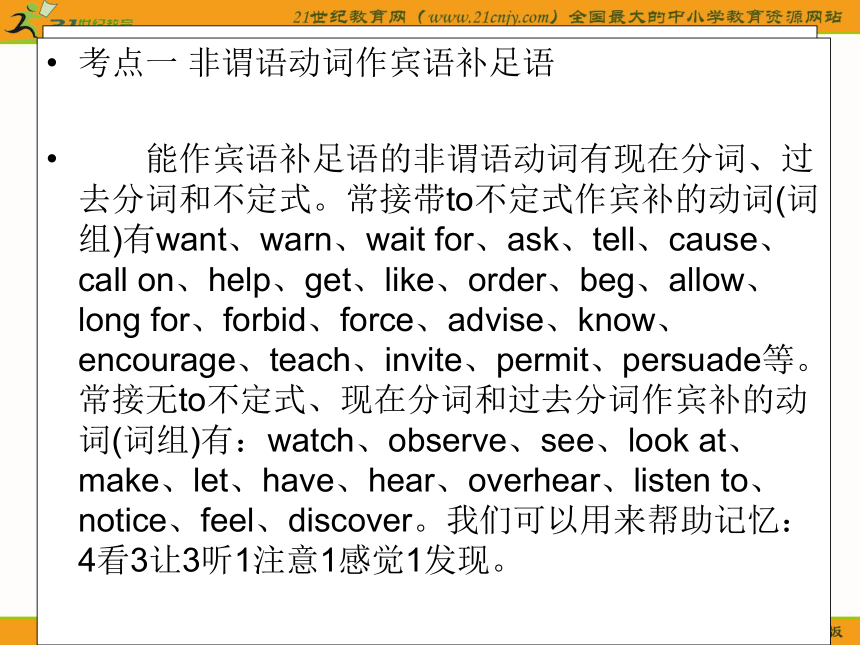
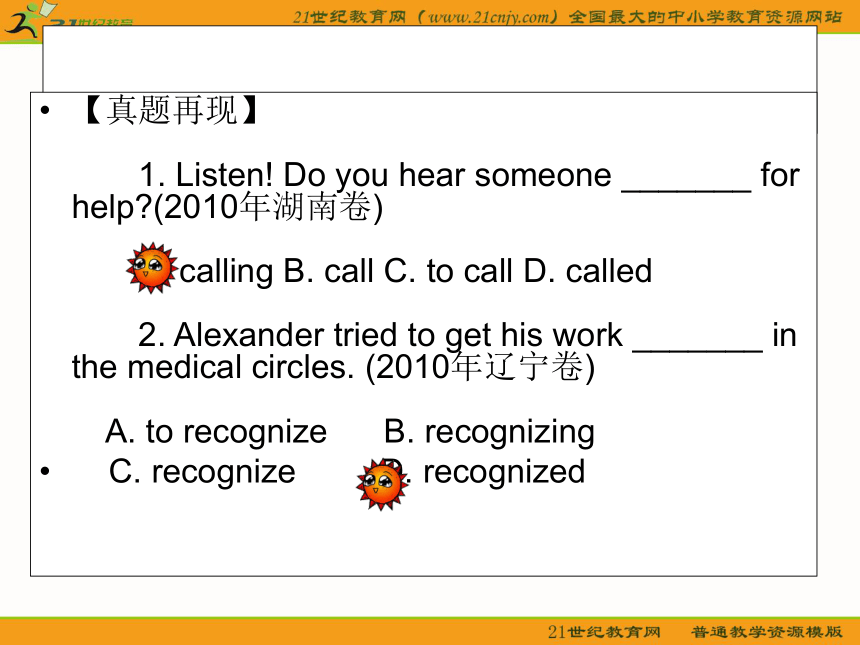
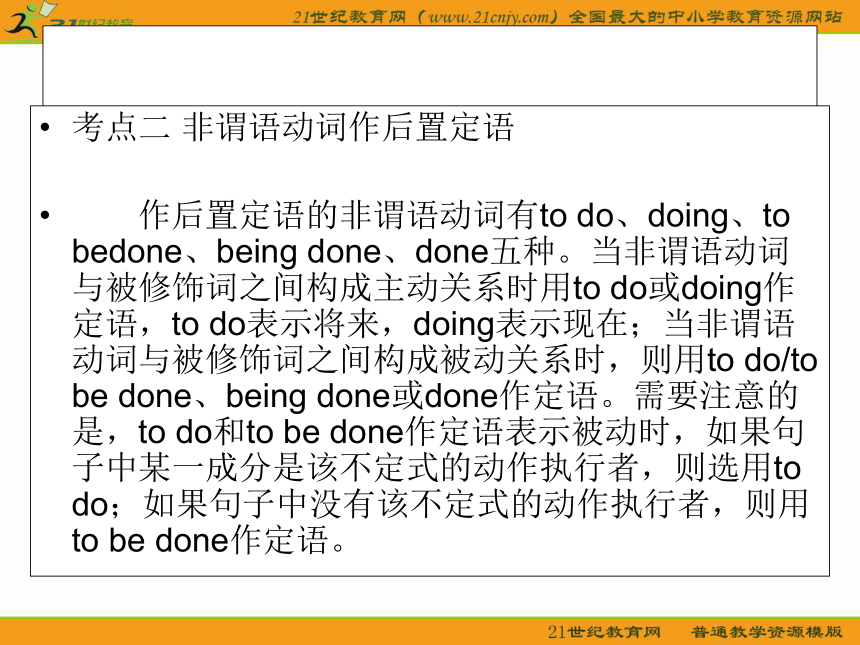

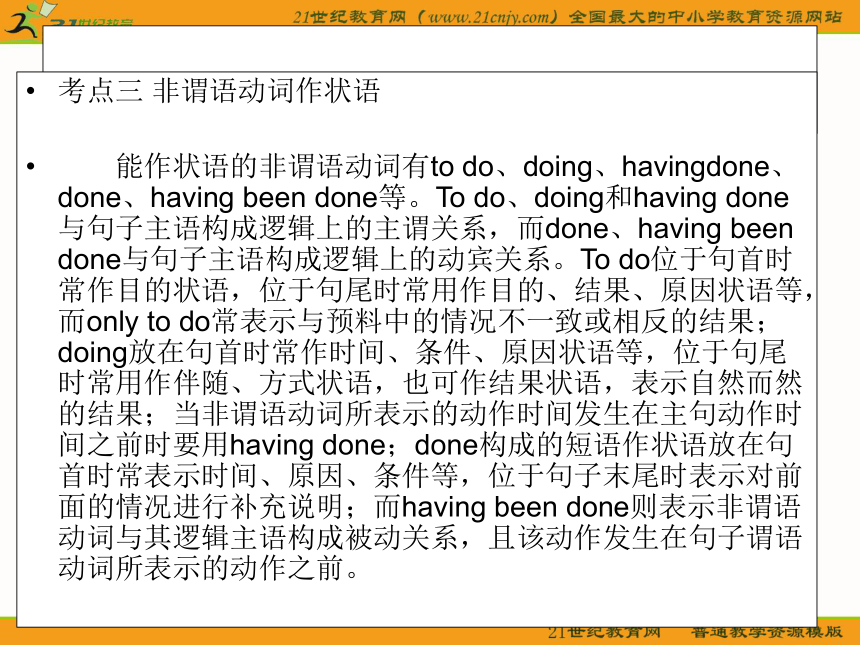
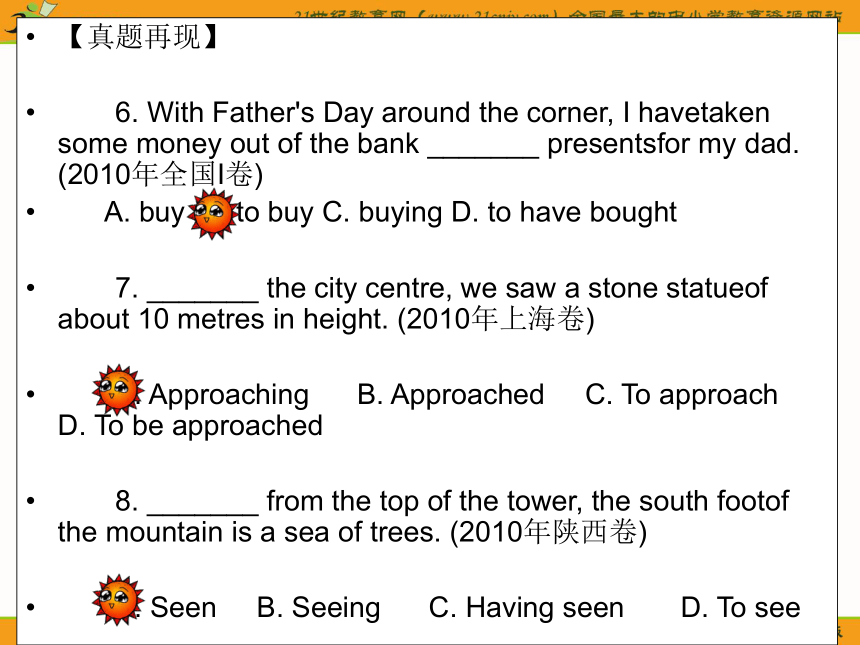
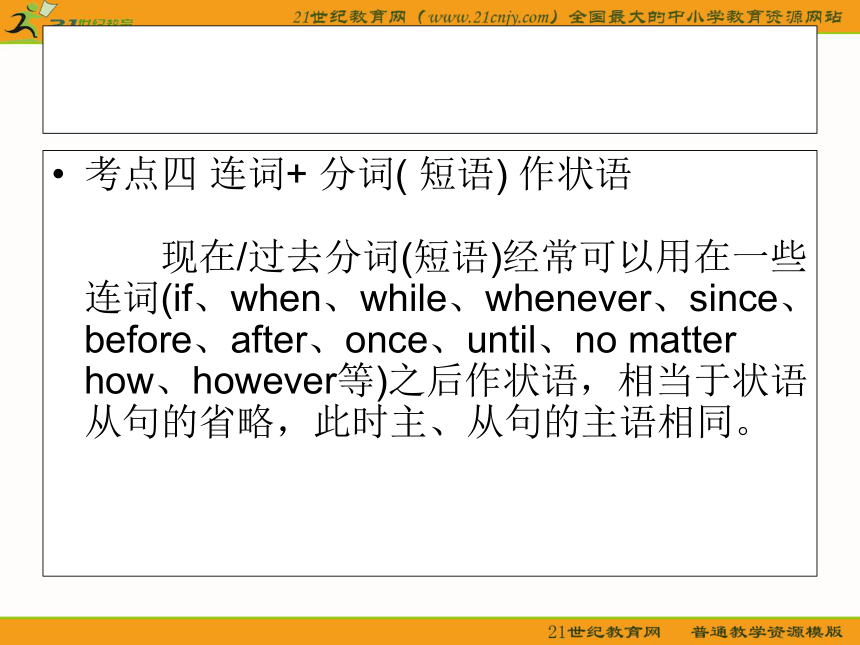
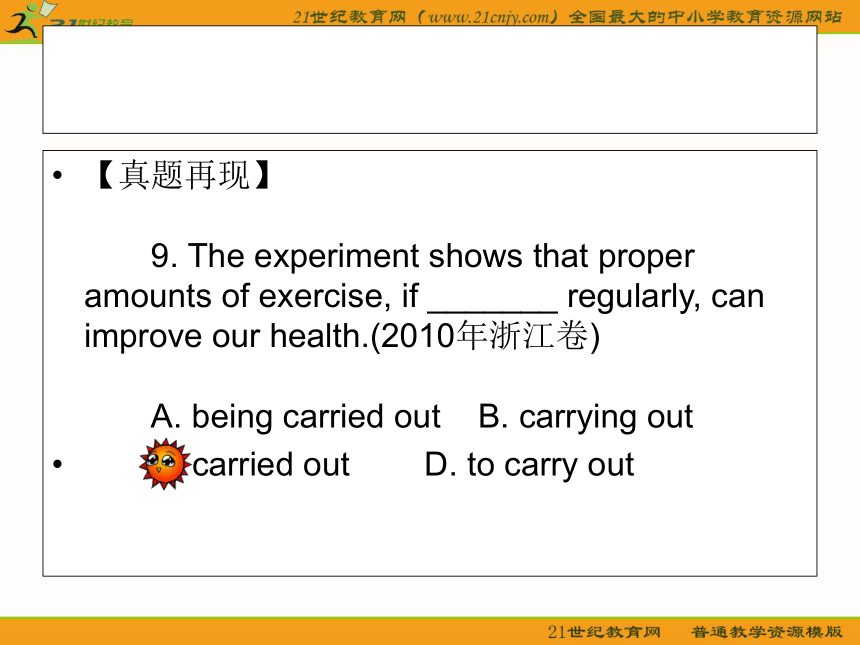
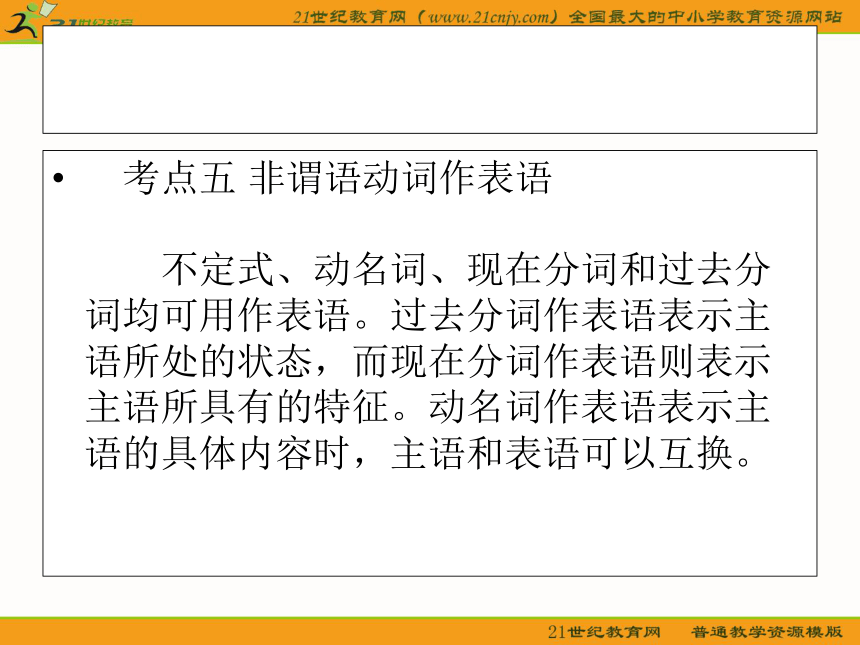
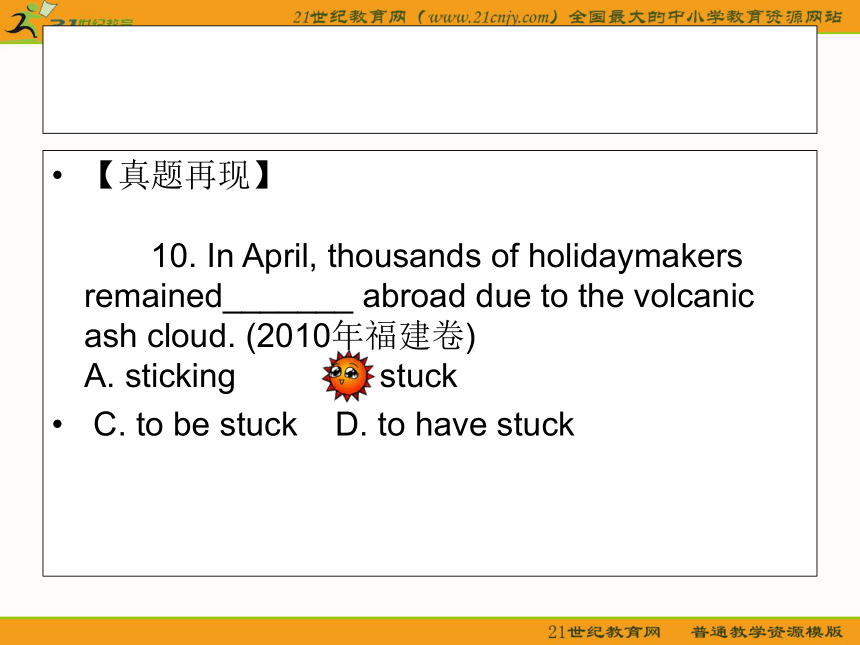
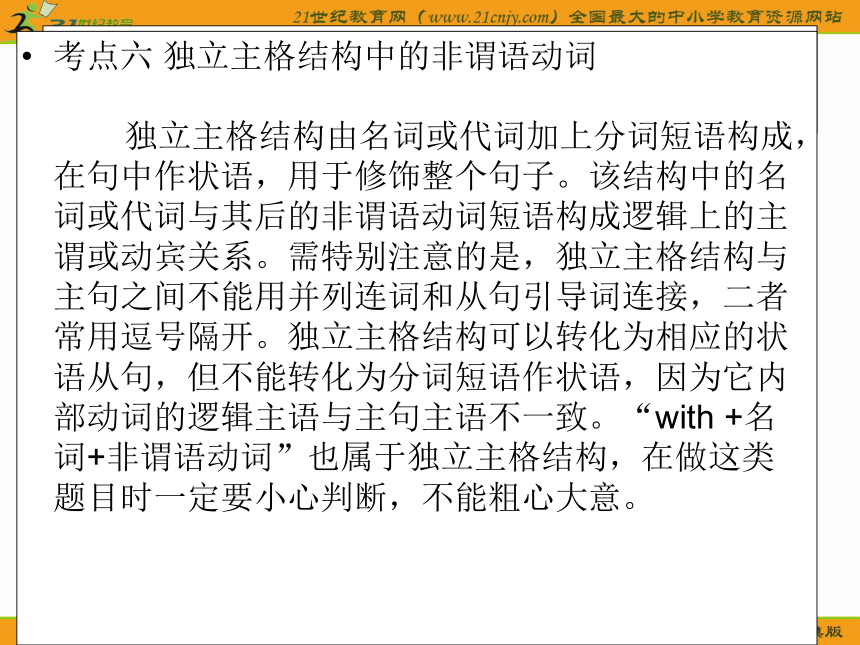
文档简介
(共38张PPT)
非谓语动词复习
考点一 非谓语动词作宾语补足语
能作宾语补足语的非谓语动词有现在分词、过去分词和不定式。常接带to不定式作宾补的动词(词组)有want、warn、wait for、ask、tell、cause、call on、help、get、like、order、beg、allow、long for、forbid、force、advise、know、encourage、teach、invite、permit、persuade等。常接无to不定式、现在分词和过去分词作宾补的动词(词组)有:watch、observe、see、look at、make、let、have、hear、overhear、listen to、notice、feel、discover。我们可以用来帮助记忆:4看3让3听1注意1感觉1发现。
【真题再现】 1. Listen! Do you hear someone _______ for help (2010年湖南卷) A. calling B. call C. to call D. called 2. Alexander tried to get his work _______ in the medical circles. (2010年辽宁卷) A. to recognize B. recognizing
C. recognize D. recognized
考点二 非谓语动词作后置定语
作后置定语的非谓语动词有to do、doing、to bedone、being done、done五种。当非谓语动词与被修饰词之间构成主动关系时用to do或doing作定语,to do表示将来,doing表示现在;当非谓语动词与被修饰词之间构成被动关系时,则用to do/to be done、being done或done作定语。需要注意的是,to do和to be done作定语表示被动时,如果句子中某一成分是该不定式的动作执行者,则选用to do;如果句子中没有该不定式的动作执行者,则用to be done作定语。
【真题再现】
3. His first book _______ next month is based on a true story. (2010年陕西卷)
A. published B. to be published C. to publish D. being published
4. The traffic rule saysyoung children under the age of four and _______ less than 40 pounds must be in achild safety seat. (2010年浙江卷)
A. being weighed B. to weighC. weighed D. weighing
5. Mrs. White showed her students some old maps _______ from the library. (2010年全国卷I)
A. to borrow B. to be borrowed C. borrowed D. borrowing
考点三 非谓语动词作状语
能作状语的非谓语动词有to do、doing、havingdone、done、having been done等。To do、doing和having done与句子主语构成逻辑上的主谓关系,而done、having been done与句子主语构成逻辑上的动宾关系。To do位于句首时常作目的状语,位于句尾时常用作目的、结果、原因状语等,而only to do常表示与预料中的情况不一致或相反的结果;doing放在句首时常作时间、条件、原因状语等,位于句尾时常用作伴随、方式状语,也可作结果状语,表示自然而然的结果;当非谓语动词所表示的动作时间发生在主句动作时间之前时要用having done;done构成的短语作状语放在句首时常表示时间、原因、条件等,位于句子末尾时表示对前面的情况进行补充说明;而having been done则表示非谓语动词与其逻辑主语构成被动关系,且该动作发生在句子谓语动词所表示的动作之前。
【真题再现】
6. With Father's Day around the corner, I havetaken some money out of the bank _______ presentsfor my dad. (2010年全国I卷)
A. buy B. to buy C. buying D. to have bought
7. _______ the city centre, we saw a stone statueof about 10 metres in height. (2010年上海卷)
A. Approaching B. Approached C. To approach D. To be approached
8. _______ from the top of the tower, the south footof the mountain is a sea of trees. (2010年陕西卷)
A. Seen B. Seeing C. Having seen D. To see
考点四 连词+ 分词( 短语) 作状语 现在/过去分词(短语)经常可以用在一些连词(if、when、while、whenever、since、before、after、once、until、no matter how、however等)之后作状语,相当于状语从句的省略,此时主、从句的主语相同。
【真题再现】 9. The experiment shows that proper amounts of exercise, if _______ regularly, can improve our health.(2010年浙江卷) A. being carried out B. carrying out
C. carried out D. to carry out
考点五 非谓语动词作表语 不定式、动名词、现在分词和过去分词均可用作表语。过去分词作表语表示主语所处的状态,而现在分词作表语则表示主语所具有的特征。动名词作表语表示主语的具体内容时,主语和表语可以互换。
【真题再现】 10. In April, thousands of holidaymakers remained_______ abroad due to the volcanic ash cloud. (2010年福建卷) A. sticking B. stuck
C. to be stuck D. to have stuck
考点六 独立主格结构中的非谓语动词 独立主格结构由名词或代词加上分词短语构成,在句中作状语,用于修饰整个句子。该结构中的名词或代词与其后的非谓语动词短语构成逻辑上的主谓或动宾关系。需特别注意的是,独立主格结构与主句之间不能用并列连词和从句引导词连接,二者常用逗号隔开。独立主格结构可以转化为相应的状语从句,但不能转化为分词短语作状语,因为它内部动词的逻辑主语与主句主语不一致。“with +名词+非谓语动词”也属于独立主格结构,在做这类题目时一定要小心判断,不能粗心大意。
【真题再现】 11. The living room is clean and tidy, with a dining table already ______ for a meal to be cooked. (2010年山东卷) A. laid B. laying C. to lay D. being laid
1. I send you 100 dollars today, the rest _____ in a year.
A. follows B. followed C. to follow D. being followed
2. _____from other continents for millions of years, Australia has many plants and animals not found in any other country in the world.
A. Being separated B. Having separated
C. Having been separated D. To be separated
1. The repairs cost a lot, but it’s money well_____.
A. to spend B. spent C. being spent D. spending
2. The prize of the game show is$30000 and an all expenses _____ vacation to China.
A. paying B. paid C. to be paid D. being paid
3. When _____help, one often says, “Thank you.” Or “It’s kind of you.”
A. offering B. to offer C. to be offered D. offered
二、考查非谓语动词的主动式与被动式
三、考查非谓语动词完成式的用法
1. The storm left, _____a lot of damage to this area.
A. caused B. to have caused C. to cause D. having caused
2. More and more people are signing up for Yoga classes nowadays, _____advantage of the health and relaxation benefits.
A. taking B. taken C. having taken D. having been taken
四、考查非谓语动词用作伴随状语
1. “You can’t catch me!” Janet shouted, _____away.
A. run B. running C. to run D. ran
2. He glanced over at her, ______ that though she was tiny, she seemed very well put together. A. noting B. noted C. to note D. having noted
3. Daddy didn’t mind what we were doing, as long as we were together, _____fun.
A. had B. have C. to have D. having
五、考查非谓语动词用作目的状语
1. “Can the project be finished as planned ” “Sure, _____it completed in time, we’ll work two more hours a day.”
A. having got B. to get C. getting D. get
2. ____ more about university courses, call (920) 746-3789.
A. To find out B. Finding out C. Find out D. Having found out
3. It was unbelievable that the fans waited outside the gym for three hours just _____a look at the sports stars.
A. had B. having C. to have D. have
六、考查非谓语动词用作结果状语
He fired, killing one of the passers-by. 他开枪了,打死了一个过路人。
Oil prices have risen by 32 percent since the start of the year, _____a record US $ 57.65 a barrel on April 4.
A. have reached B. reaching C. to reach D. to be reaching
He returned home to find his wife waiting for him. 他回到家发现他的妻子在等他。
He hurried to the station only ______ that the train had left. A. to find B. finding C. found D. to have found
一、独立主格结构的特点
1)独立主格结构的逻辑主语与句子的主语不同,它独立存在。
2)名词或代词与后面的分词,形容词,副词,不定式,介词等是主谓关系。
3)独立主格结构一般有逗号与主句分开。
The test finished, we began our holiday.
= When the test was finished, we began our holiday.
4) 当表示人体部位的词做逻辑主语时,及物动词用现在分词,不及物动词用过去分词
二、独立主格结构的构成:
1.名词(或代词) + 现在分词
现在分词表示前面的名词或代词主动进行的动作或状态。
He seating himself at the desk, his mother began to tell him a story.
Everyone being ready, the teacher began his class.
The food being cooked, the boy was watching TV.
注意:现在分词being或having been在独立主格结构中可以省略。
The weather(being)fine, we decided to go on an outing.
独立主格结构中的being在下列两种情况下一般不能省略,
一是在“There being + 名词”结构中,
二是在逻辑主语是代词的情况下。
There being no bus, we had to walk home.
It being Sunday, all the offices are closed.
2.名词(或代词) + 不定式(短语)
不定式表示将来的动作。
He suggested going for a picnic, Mary to provide the food.
Many flowers and grass to be planted, our newly-built school will look even more beautiful.
3.名词(或代词) + 过去分词
过去分词表示前面的名词或代词被动完成的动作。
The girls lay on her back, her hands crossed under her head.
The workers worked still harder, their living conditions greatly improved.
He was listening attentively in class, his eyes fixed on the blackboard.
4.名词(或代词) + 形容词(短语)
形容词(短语)在独立主格结构中说明前面名词或代词的性质、状态
The floor wet, we had to stay outside for a while.
He turned to me, his eyes sleepy.
5.名词(或代词) + 副词
副词在独立主格结构中也多是说明名词或代词的状态。
The meeting over, we all went home.
School over, we all went home.
6.名词(或代词) + 介词短语
A robber burst into the room, knife in hand.
He left the office, tears in eyes.
注意:在“逻辑主语+介词短语”构成的独立主格结构里,当介词是in时,其前后的两个名词均不加任何修饰成分。但with 的复合结构不受此限制。例如:The teacher came in, with a book in his hand.
三、独立主格结构的作用: 多用作状语
1.表示时间
His homework done(=After his homework was done),
Mary decided to go shopping.
2.表示原因
There being no buses(=Because there were no buses),we had to walk home.
3.表示条件
Weather permitting(=If weather permits),we’ll go to play basketball.
4.表示方式或伴随
He sat at the table, head down.
动词不定式表示动作没有发生或即将发生,
动词-ed形式表示动作已经结束,
动词-ing形式往往表示动作正在进行。
The manager looks worried,many things to be settled.
The manager looks relaxed, many things settled.
The man lay there, his hands trembling.
四、With( without) 的复合结构的构成以及句法功能
(一)、with / without +宾语+宾语补足语构成复合结构的几种情况:
1. with+名词/代词+形容词
He doesn’t like to sleep with the windows open.
= He doesn’t like to sleep when the windows are open.
注意:在“with+名词/代词+形容词”构成的独立主格结构中,也可用已形容词化的-ing形式或-ed形式。
With his son so disappointing,the old man felt unhappy.
With his father well-known, the boy didn’t want to study.
2. with+名词/代词+副词
The boy was walking, with his father ahead.
= The boy was walking and his father was ahead.
3. with+名词/代词+介词短语
He stood at the door, with a computer in his hand.
= He stood at the door, and a computer was in his hand.
4. with+名词/代词+动词过去分词
With his homework done, Peter went out to play.
= When his homework was done, Peter went out to play.
5. with+名词/代词+现在分词
The girl hid her box without anyone knowing where it was.
= The girl hid her box and no one knew where it was.
Without anyone noticing, he slipped through the window.
= When no one was noticing, he slipped through the window.
6. with+名词/代词+动词不定式
The little boy looks sad, with so much homework to do.
= The little boy looks sad because he has so much homework to do.
(二)、With (without) 的复合结构的句法功能:定语和状语
1. There is a magazine with a modern girl on its cover. (定语)
2. He stood in the rain, with his clothes wet.
= He stood in the rain, and his clothes were wet. (伴随状语)
3 The kid feels excited with so many places of interest to visit.
=The kid feels excited as there are so many places of interest to visit.(原因状语)
4.With the signal given, the train started.
= After the signal was given, the train started. (时间状语)
练习题
1. Everything ___ into consideration, they ought to have another chance.
to take B. taken C. to be taken D. taking
2. An expert ___ to help them tomorrow, they are sure to work out the problem.
A. will come B, coming C. to come D. having come
3. The meeting ___ over, he went to pick up his son directly
A. to be B. is C. was D. being
4. --- They sat still in the room, ___.
--- Why did they do like that
A. drawing the curtains B. with the curtains drawn
C. with the curtains drawing D. having the curtains drawn
5. The sun ___ , they continued their way.
A. has risen B. having risen C. has raised D. having raised
6. The country has already sent up three unmanned spacecraft, the most recent ___ at the end of last March.
A. has been launched B. having been launched
C. being launched D. to be launched
7. Here are two volumes, the third one ____ next month.
A. comes out B. came out C. coming out D. to come out
8. With his son___ , the old man felt unhappy.
A. to disappoint B. to be disappointing
C. disappointing D. being disappointed
9.--- Come on, please give me some ideas about the project.
---Sorry. With so much work ___ my mind, I almost break down.
A. filled B. filling C. to fill D. being filled
10. John received an invitation to dinner, and with his work ___ , he gladly accepted it .
A. finished B. finishing C. having finished D. was finished
11. ___ , I had to ask for two days’ leave.
A. Mother being ill B. Mother ill C. As mother was ill D. A, B and C
12. With so many books ___ , I couldn’t go to surf the Internet.
A. to read B. to be read C. reading D. read
13. The thief stood before the policeman ____ admitting what he had done .
A. with his dropping head B. dropping his head
C. raising his head D. with his head down
14. Winter ___ , it is time to buy warm clothes .
A .has come on B. is coming on C. coming on D. comes on
15. The old man lay on his back at the corner of the street, his eyes ___ and his hands ___.
A. close, tremble B. closed, trembling
C. closing, trembling D. closed, trembled
16. With nothing __ to burn, the fire became weak and finally died out .
A. leaving B. leave C. left D. to leave
17. It was a pity that the great writer died ___ his works unfinished .
A. for B. with C. of D. from
18. I couldn’t do my homework with that noise ___ on.
A. to go B. went C. going D. goes
19. ___ two exams to worry about, I have to work really hard this weekend.
A. Because of B. With C. As for D. Besides
20. Tom came home, ___ .
A. a dog following him B. a dog followed him
C. being followed him D. a dog was followed him
非谓语动词复习
考点一 非谓语动词作宾语补足语
能作宾语补足语的非谓语动词有现在分词、过去分词和不定式。常接带to不定式作宾补的动词(词组)有want、warn、wait for、ask、tell、cause、call on、help、get、like、order、beg、allow、long for、forbid、force、advise、know、encourage、teach、invite、permit、persuade等。常接无to不定式、现在分词和过去分词作宾补的动词(词组)有:watch、observe、see、look at、make、let、have、hear、overhear、listen to、notice、feel、discover。我们可以用来帮助记忆:4看3让3听1注意1感觉1发现。
【真题再现】 1. Listen! Do you hear someone _______ for help (2010年湖南卷) A. calling B. call C. to call D. called 2. Alexander tried to get his work _______ in the medical circles. (2010年辽宁卷) A. to recognize B. recognizing
C. recognize D. recognized
考点二 非谓语动词作后置定语
作后置定语的非谓语动词有to do、doing、to bedone、being done、done五种。当非谓语动词与被修饰词之间构成主动关系时用to do或doing作定语,to do表示将来,doing表示现在;当非谓语动词与被修饰词之间构成被动关系时,则用to do/to be done、being done或done作定语。需要注意的是,to do和to be done作定语表示被动时,如果句子中某一成分是该不定式的动作执行者,则选用to do;如果句子中没有该不定式的动作执行者,则用to be done作定语。
【真题再现】
3. His first book _______ next month is based on a true story. (2010年陕西卷)
A. published B. to be published C. to publish D. being published
4. The traffic rule saysyoung children under the age of four and _______ less than 40 pounds must be in achild safety seat. (2010年浙江卷)
A. being weighed B. to weighC. weighed D. weighing
5. Mrs. White showed her students some old maps _______ from the library. (2010年全国卷I)
A. to borrow B. to be borrowed C. borrowed D. borrowing
考点三 非谓语动词作状语
能作状语的非谓语动词有to do、doing、havingdone、done、having been done等。To do、doing和having done与句子主语构成逻辑上的主谓关系,而done、having been done与句子主语构成逻辑上的动宾关系。To do位于句首时常作目的状语,位于句尾时常用作目的、结果、原因状语等,而only to do常表示与预料中的情况不一致或相反的结果;doing放在句首时常作时间、条件、原因状语等,位于句尾时常用作伴随、方式状语,也可作结果状语,表示自然而然的结果;当非谓语动词所表示的动作时间发生在主句动作时间之前时要用having done;done构成的短语作状语放在句首时常表示时间、原因、条件等,位于句子末尾时表示对前面的情况进行补充说明;而having been done则表示非谓语动词与其逻辑主语构成被动关系,且该动作发生在句子谓语动词所表示的动作之前。
【真题再现】
6. With Father's Day around the corner, I havetaken some money out of the bank _______ presentsfor my dad. (2010年全国I卷)
A. buy B. to buy C. buying D. to have bought
7. _______ the city centre, we saw a stone statueof about 10 metres in height. (2010年上海卷)
A. Approaching B. Approached C. To approach D. To be approached
8. _______ from the top of the tower, the south footof the mountain is a sea of trees. (2010年陕西卷)
A. Seen B. Seeing C. Having seen D. To see
考点四 连词+ 分词( 短语) 作状语 现在/过去分词(短语)经常可以用在一些连词(if、when、while、whenever、since、before、after、once、until、no matter how、however等)之后作状语,相当于状语从句的省略,此时主、从句的主语相同。
【真题再现】 9. The experiment shows that proper amounts of exercise, if _______ regularly, can improve our health.(2010年浙江卷) A. being carried out B. carrying out
C. carried out D. to carry out
考点五 非谓语动词作表语 不定式、动名词、现在分词和过去分词均可用作表语。过去分词作表语表示主语所处的状态,而现在分词作表语则表示主语所具有的特征。动名词作表语表示主语的具体内容时,主语和表语可以互换。
【真题再现】 10. In April, thousands of holidaymakers remained_______ abroad due to the volcanic ash cloud. (2010年福建卷) A. sticking B. stuck
C. to be stuck D. to have stuck
考点六 独立主格结构中的非谓语动词 独立主格结构由名词或代词加上分词短语构成,在句中作状语,用于修饰整个句子。该结构中的名词或代词与其后的非谓语动词短语构成逻辑上的主谓或动宾关系。需特别注意的是,独立主格结构与主句之间不能用并列连词和从句引导词连接,二者常用逗号隔开。独立主格结构可以转化为相应的状语从句,但不能转化为分词短语作状语,因为它内部动词的逻辑主语与主句主语不一致。“with +名词+非谓语动词”也属于独立主格结构,在做这类题目时一定要小心判断,不能粗心大意。
【真题再现】 11. The living room is clean and tidy, with a dining table already ______ for a meal to be cooked. (2010年山东卷) A. laid B. laying C. to lay D. being laid
1. I send you 100 dollars today, the rest _____ in a year.
A. follows B. followed C. to follow D. being followed
2. _____from other continents for millions of years, Australia has many plants and animals not found in any other country in the world.
A. Being separated B. Having separated
C. Having been separated D. To be separated
1. The repairs cost a lot, but it’s money well_____.
A. to spend B. spent C. being spent D. spending
2. The prize of the game show is$30000 and an all expenses _____ vacation to China.
A. paying B. paid C. to be paid D. being paid
3. When _____help, one often says, “Thank you.” Or “It’s kind of you.”
A. offering B. to offer C. to be offered D. offered
二、考查非谓语动词的主动式与被动式
三、考查非谓语动词完成式的用法
1. The storm left, _____a lot of damage to this area.
A. caused B. to have caused C. to cause D. having caused
2. More and more people are signing up for Yoga classes nowadays, _____advantage of the health and relaxation benefits.
A. taking B. taken C. having taken D. having been taken
四、考查非谓语动词用作伴随状语
1. “You can’t catch me!” Janet shouted, _____away.
A. run B. running C. to run D. ran
2. He glanced over at her, ______ that though she was tiny, she seemed very well put together. A. noting B. noted C. to note D. having noted
3. Daddy didn’t mind what we were doing, as long as we were together, _____fun.
A. had B. have C. to have D. having
五、考查非谓语动词用作目的状语
1. “Can the project be finished as planned ” “Sure, _____it completed in time, we’ll work two more hours a day.”
A. having got B. to get C. getting D. get
2. ____ more about university courses, call (920) 746-3789.
A. To find out B. Finding out C. Find out D. Having found out
3. It was unbelievable that the fans waited outside the gym for three hours just _____a look at the sports stars.
A. had B. having C. to have D. have
六、考查非谓语动词用作结果状语
He fired, killing one of the passers-by. 他开枪了,打死了一个过路人。
Oil prices have risen by 32 percent since the start of the year, _____a record US $ 57.65 a barrel on April 4.
A. have reached B. reaching C. to reach D. to be reaching
He returned home to find his wife waiting for him. 他回到家发现他的妻子在等他。
He hurried to the station only ______ that the train had left. A. to find B. finding C. found D. to have found
一、独立主格结构的特点
1)独立主格结构的逻辑主语与句子的主语不同,它独立存在。
2)名词或代词与后面的分词,形容词,副词,不定式,介词等是主谓关系。
3)独立主格结构一般有逗号与主句分开。
The test finished, we began our holiday.
= When the test was finished, we began our holiday.
4) 当表示人体部位的词做逻辑主语时,及物动词用现在分词,不及物动词用过去分词
二、独立主格结构的构成:
1.名词(或代词) + 现在分词
现在分词表示前面的名词或代词主动进行的动作或状态。
He seating himself at the desk, his mother began to tell him a story.
Everyone being ready, the teacher began his class.
The food being cooked, the boy was watching TV.
注意:现在分词being或having been在独立主格结构中可以省略。
The weather(being)fine, we decided to go on an outing.
独立主格结构中的being在下列两种情况下一般不能省略,
一是在“There being + 名词”结构中,
二是在逻辑主语是代词的情况下。
There being no bus, we had to walk home.
It being Sunday, all the offices are closed.
2.名词(或代词) + 不定式(短语)
不定式表示将来的动作。
He suggested going for a picnic, Mary to provide the food.
Many flowers and grass to be planted, our newly-built school will look even more beautiful.
3.名词(或代词) + 过去分词
过去分词表示前面的名词或代词被动完成的动作。
The girls lay on her back, her hands crossed under her head.
The workers worked still harder, their living conditions greatly improved.
He was listening attentively in class, his eyes fixed on the blackboard.
4.名词(或代词) + 形容词(短语)
形容词(短语)在独立主格结构中说明前面名词或代词的性质、状态
The floor wet, we had to stay outside for a while.
He turned to me, his eyes sleepy.
5.名词(或代词) + 副词
副词在独立主格结构中也多是说明名词或代词的状态。
The meeting over, we all went home.
School over, we all went home.
6.名词(或代词) + 介词短语
A robber burst into the room, knife in hand.
He left the office, tears in eyes.
注意:在“逻辑主语+介词短语”构成的独立主格结构里,当介词是in时,其前后的两个名词均不加任何修饰成分。但with 的复合结构不受此限制。例如:The teacher came in, with a book in his hand.
三、独立主格结构的作用: 多用作状语
1.表示时间
His homework done(=After his homework was done),
Mary decided to go shopping.
2.表示原因
There being no buses(=Because there were no buses),we had to walk home.
3.表示条件
Weather permitting(=If weather permits),we’ll go to play basketball.
4.表示方式或伴随
He sat at the table, head down.
动词不定式表示动作没有发生或即将发生,
动词-ed形式表示动作已经结束,
动词-ing形式往往表示动作正在进行。
The manager looks worried,many things to be settled.
The manager looks relaxed, many things settled.
The man lay there, his hands trembling.
四、With( without) 的复合结构的构成以及句法功能
(一)、with / without +宾语+宾语补足语构成复合结构的几种情况:
1. with+名词/代词+形容词
He doesn’t like to sleep with the windows open.
= He doesn’t like to sleep when the windows are open.
注意:在“with+名词/代词+形容词”构成的独立主格结构中,也可用已形容词化的-ing形式或-ed形式。
With his son so disappointing,the old man felt unhappy.
With his father well-known, the boy didn’t want to study.
2. with+名词/代词+副词
The boy was walking, with his father ahead.
= The boy was walking and his father was ahead.
3. with+名词/代词+介词短语
He stood at the door, with a computer in his hand.
= He stood at the door, and a computer was in his hand.
4. with+名词/代词+动词过去分词
With his homework done, Peter went out to play.
= When his homework was done, Peter went out to play.
5. with+名词/代词+现在分词
The girl hid her box without anyone knowing where it was.
= The girl hid her box and no one knew where it was.
Without anyone noticing, he slipped through the window.
= When no one was noticing, he slipped through the window.
6. with+名词/代词+动词不定式
The little boy looks sad, with so much homework to do.
= The little boy looks sad because he has so much homework to do.
(二)、With (without) 的复合结构的句法功能:定语和状语
1. There is a magazine with a modern girl on its cover. (定语)
2. He stood in the rain, with his clothes wet.
= He stood in the rain, and his clothes were wet. (伴随状语)
3 The kid feels excited with so many places of interest to visit.
=The kid feels excited as there are so many places of interest to visit.(原因状语)
4.With the signal given, the train started.
= After the signal was given, the train started. (时间状语)
练习题
1. Everything ___ into consideration, they ought to have another chance.
to take B. taken C. to be taken D. taking
2. An expert ___ to help them tomorrow, they are sure to work out the problem.
A. will come B, coming C. to come D. having come
3. The meeting ___ over, he went to pick up his son directly
A. to be B. is C. was D. being
4. --- They sat still in the room, ___.
--- Why did they do like that
A. drawing the curtains B. with the curtains drawn
C. with the curtains drawing D. having the curtains drawn
5. The sun ___ , they continued their way.
A. has risen B. having risen C. has raised D. having raised
6. The country has already sent up three unmanned spacecraft, the most recent ___ at the end of last March.
A. has been launched B. having been launched
C. being launched D. to be launched
7. Here are two volumes, the third one ____ next month.
A. comes out B. came out C. coming out D. to come out
8. With his son___ , the old man felt unhappy.
A. to disappoint B. to be disappointing
C. disappointing D. being disappointed
9.--- Come on, please give me some ideas about the project.
---Sorry. With so much work ___ my mind, I almost break down.
A. filled B. filling C. to fill D. being filled
10. John received an invitation to dinner, and with his work ___ , he gladly accepted it .
A. finished B. finishing C. having finished D. was finished
11. ___ , I had to ask for two days’ leave.
A. Mother being ill B. Mother ill C. As mother was ill D. A, B and C
12. With so many books ___ , I couldn’t go to surf the Internet.
A. to read B. to be read C. reading D. read
13. The thief stood before the policeman ____ admitting what he had done .
A. with his dropping head B. dropping his head
C. raising his head D. with his head down
14. Winter ___ , it is time to buy warm clothes .
A .has come on B. is coming on C. coming on D. comes on
15. The old man lay on his back at the corner of the street, his eyes ___ and his hands ___.
A. close, tremble B. closed, trembling
C. closing, trembling D. closed, trembled
16. With nothing __ to burn, the fire became weak and finally died out .
A. leaving B. leave C. left D. to leave
17. It was a pity that the great writer died ___ his works unfinished .
A. for B. with C. of D. from
18. I couldn’t do my homework with that noise ___ on.
A. to go B. went C. going D. goes
19. ___ two exams to worry about, I have to work really hard this weekend.
A. Because of B. With C. As for D. Besides
20. Tom came home, ___ .
A. a dog following him B. a dog followed him
C. being followed him D. a dog was followed him
同课章节目录
